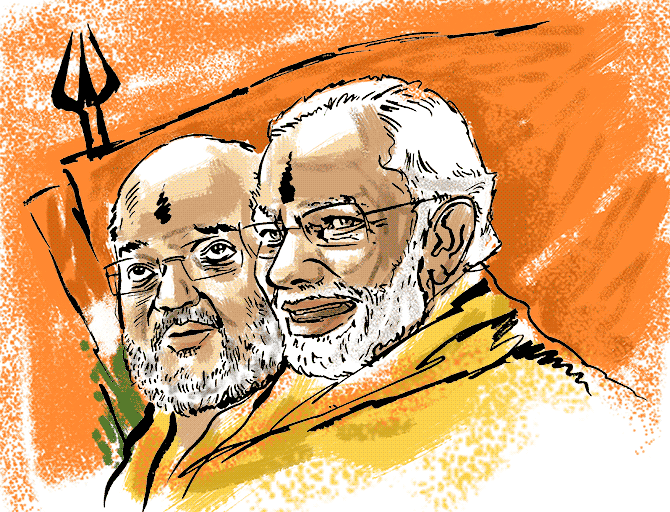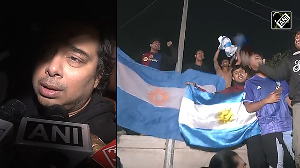'It is this new brand of nationalism, where the saffron has elbowed out the other shades in our Tiranga, that will go before the electorate later this year.'
'And it is this new nationalism that will power Modi back into office with 300-plus seats when elections are held,' says Saisuresh Sivaswamy.
Illustration: Dominic Xavier/Rediff.com

Kashmir, it is often said, is the pivot on which Indian secularism turns, a solitary Muslim state in a predominantly Hindu nation whose demographic, despite all the nay-sayers and Cassandras breast-beating about being overrun by religious minorities, is not going to change in any of our lifetimes or even beyond.
But looked at from the other side, Kashmir is also the jewel in the crown of votaries of a Hindu nation, even a quasi Hindu one, the only state yet to reclaim its original ethos.
Of the Bharatiya Janata Party's three chief manifesto promises, one pertains to this border state -- abrogation of Article 370, which confers a special status on Jammu and Kashmir.
Failure on the other two promises -- enacting a Uniform Civil Code and erecting a Ram mandir in Ayodhya -- can be sold to the electorate.
A beginning has been made in the former by abrogating instant talaq, after all, and in the latter a decision can only be taken after the Supreme Court pronounces its verdict.
But failure on Article 370 is hard to sell to the BJP's core voter, especially after having been in power in the state for three years, in league with its most unlikely ally, the People's Democratic Party.
The failure to move even an inch on this promise becomes more glaring when the BJP's own core voters from Jammu and elsewhere turn restive.
The BJP cannot afford to lose Jammu, its bastion, over Kashmir, which it can never win.
The architects of the alliance between the BJP and PDP three years ago knew this arithmetic but still went ahead -- with a clear game plan, and time line.
One needn't be a brain surgeon to know that the Kashmir problem defies a solution; the best that can be done is to maintain the status quo, even while praying for a miracle.
Different parties take different things from Kashmir; the BJP's takeaway was how to leverage the state for its 2019 election campaign.
More than the suddenness of the decision to pull out of the alliance, it is Mehbooba Mufti's refusal to criticise the BJP at her press conference on Tuesday that shows the BJP's game plan was always known to its frenemy.
If it was an unexpected letdown, the response would have been strident, not passive. The PDP always expected the boom to be lowered on the government, it was only a question of time.
If anything, the abruptness of the BJP's announcement indicates that the Lok Sabha elections are most likely to be advanced to end of this year.
Not only will it leave the fragmented Opposition with little time to get its act together against the BJP, but it will also secure the latter against any further slide in public sentiment.
Even if elections are held on schedule, in the summer of 2019, there is very little chance of the voter not returning Modi to 7 Jan Kalyan Marg.
But the feedback from the ground, as well as the sound bytes from the Opposition camp, show that the BJP cannot altogether rule out a slump in its parliamentary numbers.
The BJP has been able to ride rough shod over its National Democratic Alliance partners only because of its legislative majority; sans that, it would be another version of the UPA, with allies buffeting it with claims and counter-claims.
And Modi has never helmed a coalition government; it is not in his DNA to yield.
Clearly, the emerging political scenario doesn't seem right for placing wagers on what will happen in 2019.
Modi and his lieutenant Amit A Shah may be gamblers, but their political mentors in Nagpur prefer certainty over probability.
And the certainty after four years of Modi Raj is that Vikas, that magic word from 2014, is well past its sell-by date.
Anyway, even in 2014, it was only a convenient fig leaf to cover up the BJP's real campaign that it ran on the ground, and it suited the white collars too who would have otherwise been shocked to be told that they had voted for anything but development, for the nation always comes first.
But four years of Modi's rule has removed this queasiness many felt about associating with a majoritarian formula.
What once lurked in the fringes of the political discourse today is delivered from the pulpits of our television studios prime time after prime time, so fashionable has it become to vocalise Middle India's new angst.
Repackaging can work wonders at the hands of a marketing genius. And Modi-Shah have shown that not only are they masters of the political narrative, but they can also sell coal to Jharkhand, with a little help from their army of ideologically attuned frenetic volunteers.
So it is that Vikas has been achieved, the economy has been put back on the rails, the agriculture sector has been rescued, the working class has been protected, price rise has been contained, new jobs have been created and the middle class is happiest.
Say this a few hundred times, and it soon becomes the accepted truth.
Similarly, Hindutva has been repackaged too, this time as nationalism.
That's how it becomes right for a cell phone customer to ask her service provider to replace the customer relations executive belonging to another faith.
How is this nationalism? Because her social media DP flaunts that ultimate sign of India's new nationalism -- the tricolour. Do you dare argue with it?
How did the same flag that was once flown by our brave soldiers from the peaks of Kargil come to adorn the bodies of murderers and such, is the story of how India's nationalism has been repackaged in the last four years.
It is this new brand of nationalism, where the saffron has elbowed out the other shades in our Tiranga, that will go before the electorate later this year.
And it is this new nationalism that will power Modi back into office with 300-plus seats when elections are held.
All the disparate campaigns -- from Rohith Vemula to JNU to Kathua to Andaal, to name just a few -- and which were dismissed as stray protests, were in fact all part of a larger narrative.
They were but pit stops in the BJP's marathon run to re-election, the last of which was Kashmir.
India's most scenic, and most troubled, state could have had a different script, and a different ending, but tragically the lead roles went to two incompatible artistes.
But the hero in this script is like Salman Khan who can walk away from any disaster with his fan club intact.
![]()










